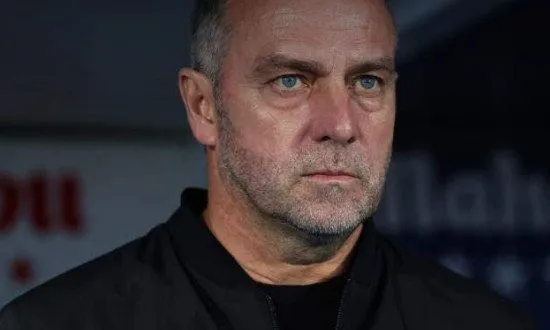As Barcelona prepare for a crucial La Liga clash against Real Mallorca in Matchday 33, all eyes are on Hansi Flick’s men, who are determined to strengthen their grip at the top of the table. However, in the build-up to the encounter, the spotlight has shifted from tactics and formations to a growing tension within the squad—sparked by none other than the head coach himself.
According to reports from Spanish outlet El Nacional, tensions have emerged between Flick and two of his young stars—Ansu Fati and Héctor Fort—after they were left out of the action in a recent match despite warming up during the second half. Flick’s decision to overlook them for substitutions appears to have ignited visible frustration, especially from Fati, who remained on the bench throughout.
In Fort’s case, the young full-back reportedly avoided the traditional post-match handshake with the German manager. As for Ansu Fati, the situation seemed even more heated. The 21-year-old, who still wears the iconic No. 10 jersey once donned by Lionel Messi, showed his displeasure by staying glued to the bench after spending around 30 minutes warming up in the second half.
The issue took center stage during Flick’s press conference ahead of the Mallorca game. While addressing the media, Flick didn’t hold back. His comments were sharp, direct, and pointed—a public message to the disgruntled duo that left no room for interpretation.
“I understand their disappointment,” Flick began, “but I do not understand the way they reacted. I was a player too. I know every footballer wants to play, to prove they deserve a spot. That’s normal. But the way you express your frustration matters.”
Flick, who took over the reins at Barcelona earlier this season with high expectations, made it clear that professionalism and discipline are non-negotiable under his leadership. He stressed that while emotional responses are natural, how a player handles adversity defines their character.
“This isn’t the right way to deal with disappointment,” he stated. “As a player, you need to accept the coach’s decisions, even if you disagree with them. Against Celta Vigo, we made the right calls and came back from 3-1 down. Every decision has a purpose, and they need to understand that.”
In what appeared to be both a critique and a challenge, Flick added a bold statement aimed squarely at Fati and Fort: “I want to see their response inside the pitch—not outside of it. That’s the only place that counts.”
The message was crystal clear: body language on the touchline, sulking, or skipping handshakes won’t earn players minutes. Only performance, attitude, and work ethic during training and in matches will.
The coach used the moment to re-emphasize the values he expects in the dressing room. “There’s a certain way we do things here. Respect, commitment, and unity—these are essential. Anyone who wants to play must first show that they respect the team.”
It’s a significant moment in Flick’s tenure. While Barcelona are still within reach of domestic glory, internal tensions like these can either galvanize or fracture a squad—especially when they involve promising talents who feel they deserve more minutes.
For Ansu Fati, the situation is particularly delicate. Once seen as the future of the club, his career has been marred by injuries and inconsistent form. This season, under Flick, he’s struggled to reclaim a regular starting spot. Fort,


